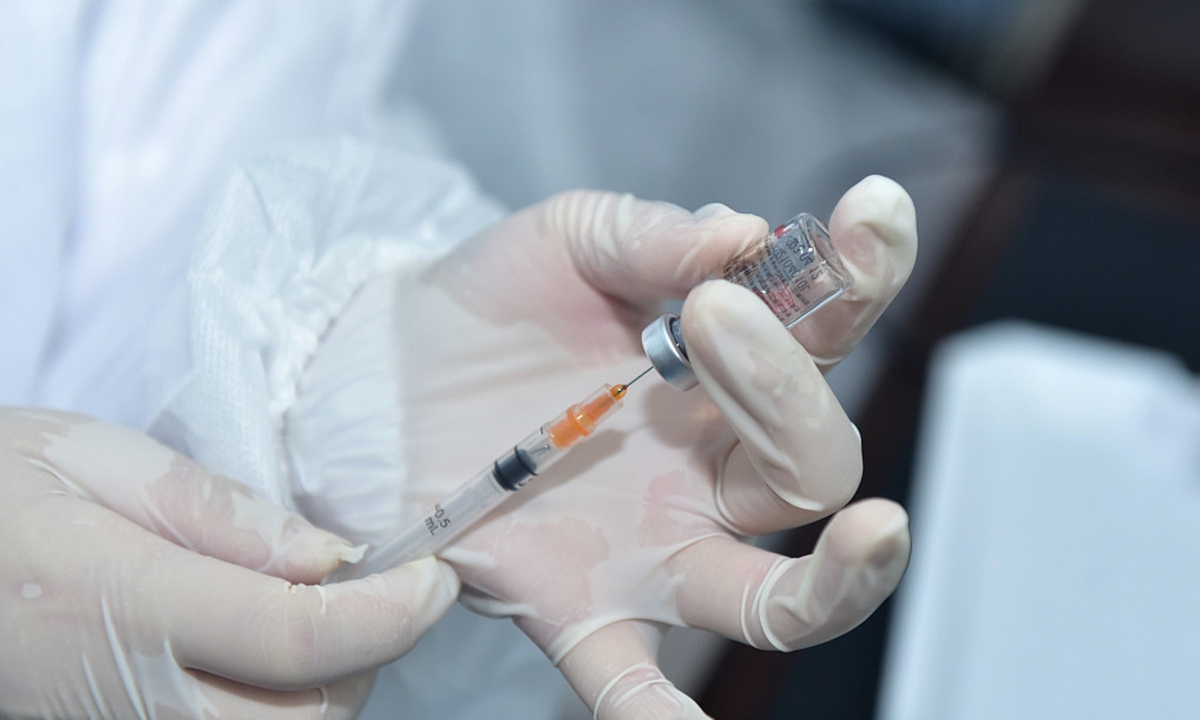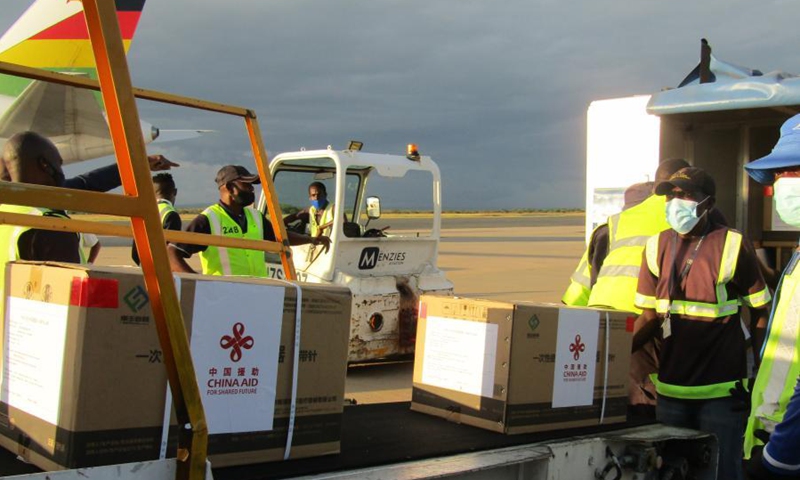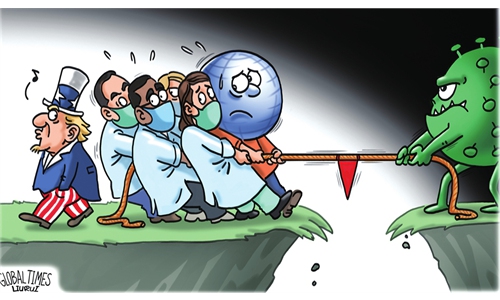US’ new vaccine donation pledge receives cautious welcome in China, believed to aim at ‘weaponizing doses to contain China, Russia’

Photo: VCG
After snapping up some 2.6 billion doses of vaccines and leaving hundreds of millions of unused vaccine doses piled up in the warehouses, the US has finally decided to donate 80 million of them to the world, while China has been offering vaccines and medical supplies to developing countries for nearly half a year.
Chinese observers gave a guarded welcome to US President Joe Biden's pledge of sharing 80 million doses of vaccines globally, but they expressed doubts over whether developing countries in urgent need of vaccines will actually receive them considering the US' stock-in-trade of sloganeering despite inaction. Some believe that the US will prioritize sending vaccines to its so-called democratic allies in exchange for behind-the-scenes political deals.
Considering the US' excellent performative skills, yet its extensive history of being all talk but no action, the US often finds it difficult to honor its own pledges, observers said.
In the same speech that he announced the vaccine donations, Biden went on to blame China and Russia for "vaccine diplomacy" while touting American democratic values. This fully reveals that US' malicious and selfish purposes in weaponizing vaccines and wooing allies to contain China and Russia, while at the same time attempting to maintain its leadership, analysts said.
The 80 million doses include previously committed 60 million doses of the AstraZeneca vaccine that the US has not yet authorized for domestic use and 20 million doses from Pfizer-BioNTech, Moderna and Johnson & Johnson, already approved domestically.
Some US media claimed it was "the first time the US has said it will share vaccines authorized for domestic use." Even so, Biden's pledge will not be implemented until the end of June, according to his speech published on the website of the White House.
While announcing the plan, Biden criticized Russia and China for "influencing the world with vaccines," and claimed the US will not use its vaccines to "secure favors from other countries."
In response to what Biden said, Zhao Lijian, spokesperson of Chinese Foreign Ministry, noted at Tuesday's routine media briefing that China welcomes efforts by the US to honor its commitment of offering vaccine assistance at an early date and provide tangible help to developing countries in their fight against the epidemic.
It is despicable that the US makes an issue out of China whenever the topic of vaccines is brought up. It sets people wondering about US true intention and motives, Zhao said.
China's offer of vaccines and other supplies is not trying to secure favors from others,and China's assistance comes with no geopolitical agenda or political strings, Zhao said.
"We will do our utmost to let people breathe because every life matters, regardless of his or her nationality and race," Zhao said.
The US' donation is more like a forced action amid global criticism of the US following its previous empty promise of waiving vaccine patents, Lü Xiang, a research fellow on US studies with the Chinese Academy of Social Sciences in Beijing, told the Global Times on Tuesday.
Meanwhile observers said that Biden is under great pressure and his hand was forced as China, its perceived strategic competitor, has garnered wide plaudits from the developing world for its responsible actions to help other countries and regions tackle COVID-19 with no strings attached.
In his speech, Biden did not just criticize China and Russia over "vaccine diplomacy," he also touted the US' leadership and democratic values.
"Just as democracies led the world in the darkness of World War II, democracies will lead the world out of this pandemic," Biden said, adding that the US will lead those democracies, according to the website of the White House.
It is like Biden is promoting a COVID-19 alliance of democracies, with the aim of wooing some of its allies to contain China and Russia, instead of uniting the majority of countries and regions to jointly tackle COVID-19, Li Haidong, a professor at the Institute of International Relations at China Foreign Affairs University, told the Global Times on Tuesday.
What the US is fighting is a selective battle against COVID-19 out of selfish purposes, which will not help end the pandemic, Li said.
What's worse, US media outlets are still blindly following the US government in blaming China for the pandemic. In a commentary published in the Wall Street Journal on Monday, the author claimed COVID-19 "came from China. The most effective vaccines against it come from the United States of America."
The commentary is an attempt by US elites to use the so-called superiority of their system to hide their failures in controlling their domestic epidemic. Although it has inoculated about half of its own population, the US still reports hundreds of COVID deaths every day, Lü said.
Lü expressed his sympathy and also helplessness over the US elites' self-deception.
"They really need to reflect now on their gains and losses during the fight against the epidemic as well as the deficiencies of their system, rather than smearing other countries, or their system will get worse and worse," Lü said.
The Wall Street Journal commentary advises the US to use vaccine diplomacy to show the world what US leadership looks like, which is a blunt indictment of what lies at the heart of the US government, analysts said.
Some analysts specializing in health and international affairs also doubt whether the US will be able to implement its pledge.
"Biden was just saying a number, I highly doubt whether it will translate this into a concrete action," Li said. He said whether the vaccine companies would give him that number of vaccine doses and whether the US Congress will throw obstacles or conditions in the way that is unknown to all.
From the vaccine types the US will donate, about 60 million doses are AstraZeneca, which has some safety concerns over blood clots, and the US is just giving away what it does not want to use, a Beijing-based immunologist who requested anonymity told the Global Times on Tuesday.
"The US, as a great power, could have done more and earlier, but they did nothing when the world was in urgent need. Now the epidemic has been out of control in many places like India, Brazil and South Africa, so what can 80 million doses do for people in these countries? What could 80 million doses do for 8 billion people in the world?" Lü asked.
Biden claimed the 80 million doses were far more than the doses Russia and China has donated combined, so far around 15 million doses, according to the White House.
The Biden administration boasted about such a small move and tried to use it to mock others - China and Russia - which is "shameless" for a president of a big power, Lü said.
But the US instead stockpiled far more vaccines than it actually needs. With a population of around 330 million, the US has snapped up about 2.6 billion doses of vaccines, one-quarter of the world's total, Zhao said.
Bloomberg in April reported that unused COVID-19 vaccines are piling up across the US, and its calculations showed that "the worst-performing quartile of states holds 14.1 million unused doses."
According to Bloomberg, BioNTech SE and Pfizer have the capacity to produce as many as 3 billion doses of their COVID-19 vaccines this year.
And Moderna said in April that it raised its 2021 manufacturing supply forecast to between 800 million to 1 billion doses.
While Biden is just starting to talk about a plan which may not be implemented, China has offered actual vaccine help and other medical supplies to many developing countries in Africa and South East Asia since early this year.

Boxes containing China-donated vaccines are loaded onto a truck at the Hosea Kutako International Airport in Namibia's capital Windhoek on March 16, 2021.Photo:Xinhua
China was the first country to commit to making vaccines a kind of global public goods. It has offered vaccines to some 80 countries and regions, exported vaccines to some 50 countries and regions and cooperated with 10 developing countries to produce Chinese vaccines in their countries, according to data the Chinese Foreign Ministry released on Tuesday.China's vaccine assistance occurred at the same time as the world's most populous country has been trying to expand inoculation coverage of its 1.4 billion people. The proportion of China's vaccine supply for domestic use equals those it has offered the world through donations or sales.
Vaccine provided with under-the-table deals
While Biden repeatedly claimed that the US will not donate the vaccines to other countries in a quid pro quo move, Chinese observers are not buying that.
Lü said that given the US' previous practices, conditions must surely be attached when they donate doses to others, although some are behind the scenes.
He predicted that the US may give priority to India and Brazil, but that it could be no more than a conciliatory gesture to the two populous countries that felt hurt by the US' ugly "America First" doctrine on vaccines.
The above-quoted Chinese immunologist said the US may use the vaccine donations to rope in its allies, and that it is possible the US may set up additional conditions such as restricting the way the countries use it, or designating those countries receiving the donations to purchase US-made facilities to transport and store those vaccines.
The US has likely stockpiled the 2.6 billion doses, far more than it needed, for strategic purposes to exchange political interests with other countries, he said.
Biden claimed that the US with its 80 million donated doses will be the arsenal of vaccines for the rest of the world, but the immunologist doubted this.
"The US could be hit by a new wave of COVID-19 before it manages to be the world vaccine arsenal as many Americans who were vaccinated are not wearing masks, which is a dangerous move," he remarked.
In terms of tackling COVID-19, vaccines cannot provide 100 percent protection, and scientific and strict prevention measures are also very important. The US has been among the worst in implementing such measures, and it continues to shift the blame to other countries including China, experts said.


